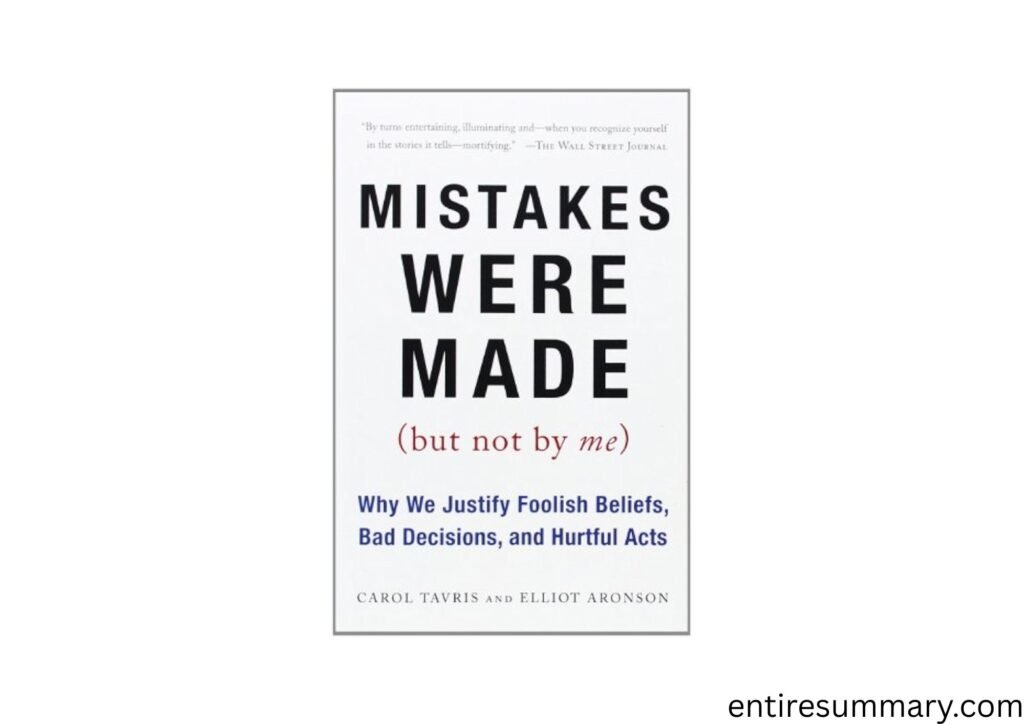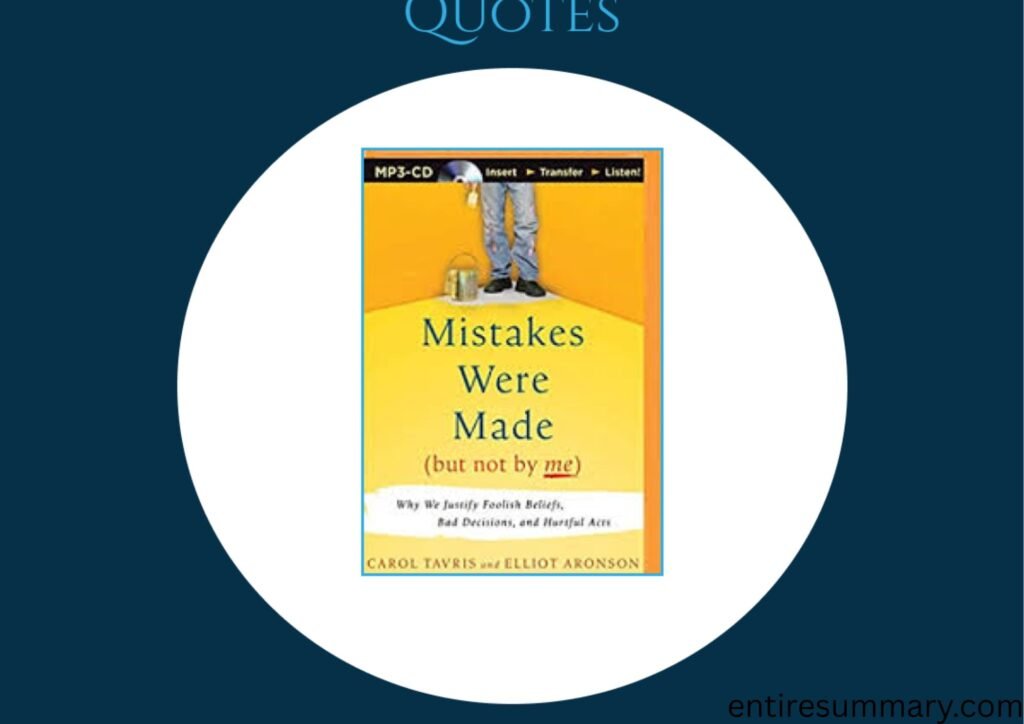Mistakes Were Made But Not by Me, Carol Tavris and Elliot Aronson’s book, is a pioneering work in psychology that delves into the reasons why individuals rationalize their poor choices, damaging behaviors, and mistaken convictions. rather than admitting they were wrong. First published in 2007 and updated in later editions, it combines psychology, history, politics, and personal behavior to show how self-justification shapes human behavior.
The book matters because it forces us to look in the mirror and ask: Why do we cling so tightly to beliefs even when evidence proves us wrong?
First Half Summary (Key Themes and Ideas)
The first half of Mistakes Were Made but Not by Me focuses on the psychology of self-justification and how it affects everyday decisions, relationships, politics, and even criminal justice.
- Cognitive Dissonance
- Central to Mistakes Were Made but Not by Me is cognitive dissonance, the mental discomfort we feel when our actions conflict with our beliefs.
- Instead of admitting fault, people often adjust their beliefs to match their actions, protecting their self-image.
- The Pyramid of Choice
- Tavris and Aronson use a metaphor: two people start at the top of a pyramid with slightly different opinions.
- As they make decisions and justify them, they move downward in opposite directions, becoming more extreme.
- This explains how small differences in choices can lead to drastically opposing positions over time.
- Memory Distortion
- People unconsciously alter memories to fit their current self-image.
- For example, we remember past decisions as being more rational than they actually were.
- This explains why people insist they “knew it all along” when clearly they didn’t.
- Relationships and Marriage
- In personal relationships, self-justification often prevents people from apologizing or admitting mistakes.
- Small conflicts can escalate because neither side wants to admit fault, each reinforcing their own narrative.
- Law and Justice
- Mistakes Were Made but Not by Me highlights how wrongful convictions persist.
- Once police or prosecutors decide on a suspect, cognitive dissonance makes it hard for them to admit mistakes even when new evidence emerges.
- This leads to tragic cases where innocent people remain imprisoned while officials defend flawed decisions.
- Politics and Leadership
- Leaders often double down on failed policies because admitting error would damage their reputation.
- Historical examples show how wars and scandals worsened when leaders refused to acknowledge mistakes.
Also read: /the-power-of-habit/

Second Half Summary (Resolution and Broader Applications)
The second half of Mistakes Were Made but Not by Me shows how self-justification impacts broader issues and how we can counter it in daily life.
- Science and Medicine
- Doctors sometimes resist new evidence that contradicts old practices, leading to harmful outcomes.
- The authors show how even science, which prides itself on objectivity, is subject to human bias.
- Memory, Trauma, and False Beliefs
- False memories play into self-justification.
- People can become absolutely certain about events that never happened, reinforcing their worldview.
- War, Terrorism, and Conflict
- Self-justification doesn’t just apply to individuals—it drives nations too.
- Leaders justify wars by framing them as necessary, even when evidence shows otherwise.
- This creates cycles of violence where neither side admits mistakes.
- Personal Growth
- Despite the heavy topics, Tavris and Aronson argue that awareness of self-justification can help.
- Admitting mistakes isn’t weakness—it’s a path to growth, learning, and stronger relationships.
- Humility as a Tool
- They stress the importance of humility, curiosity, and willingness to update beliefs.
- By practicing openness, people can reduce the trap of doubling down on errors.
Key Takeaways
- Cognitive dissonance is powerful. We’d rather twist our beliefs than admit mistakes.
- Small choices snowball. Over time, justifications push us toward more extreme positions.
- Memory is unreliable. Our brains automatically alter past events to keep our self-image intact.
- Self-justification sustains injustice. From wrongful convictions to failed wars, refusal to admit error has massive consequences.
- Admitting mistakes builds strength. Awareness of self-justification can improve relationships, decision-making, and leadership.
7 FAQs About Mistakes Were Made (But Not by Me)
Plot/Concept FAQs
1. What is the core thesis of the book?
That humans are wired to justify their mistakes instead of admitting them, and this shapes our behavior at both personal and societal levels.
What is the “Pyramid of Choice”?
It’s a metaphor showing how small differences in initial choices lead to extreme differences over time as people justify their decisions.
How does the book explain wrongful convictions?
Once law enforcement decides someone is guilty, cognitive dissonance makes it hard to consider new evidence, leading to persistent errors.

Application FAQs
How can I apply the lessons to my life?
By noticing when you feel defensive or resistant to evidence, pausing, and considering whether self-justification is at play.
How does this help in relationships?
Admitting fault quickly can stop conflicts from escalating and strengthen trust with others.
Fun/Thought-Provoking FAQs
Is the book depressing or hopeful?
It’s realistic but hopeful. While it shows how stubborn we can be, it also suggests ways to overcome self-justification.
Is it similar to other psychology books?
That’s a great question. While it definitely touches on similar topics as books like Thinking, Fast and Slow or Predictably Irrational, its deep dive into the specific psychology of self-justification is what really sets it apart.
Final Thoughts
Mistakes Were Made (But Not by Me) is an eye-opening read. Tavris and Aronson don’t just explain why people defend bad choices — they show how this habit shapes relationships, politics, science, and justice. The book is a mirror, forcing us to ask how often we excuse our own mistakes while pointing out others’.

